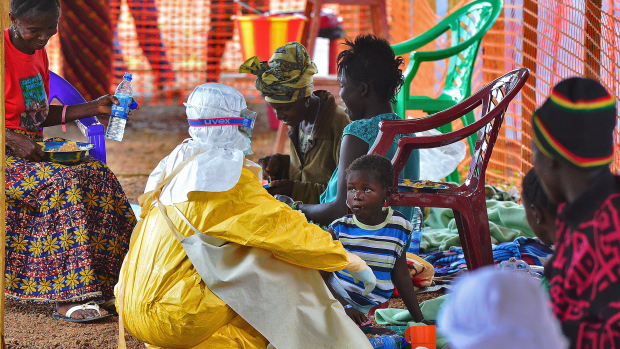An experimental antiviral drug shows some early, encouraging signs of effectiveness in its first human test against Ebola in West Africa, but only if patients get it when their symptoms first appear.
A study of the drug, favipiravir (fav-ih-PEER-ah-veer), is still in early stages in West Africa, and too few people have been treated to really know whether the drug helps. Other factors, like better health care, may be making a difference, and there was no comparison group of patients who got no treatment or a different drug.
Results for the first 69 adults and teens in Guinea were released Monday. Among those who got the drug when virus levels were still low, survival was 85 percent. That seems better than the roughly 70 percent survival for patients treated in the same clinics two months before the study began, researchers said at the Retrovirus Conference in Seattle.
The drug made no difference for those who got it later. Unfortunately, the median time of symptoms when patients sought care was five days, and the infection often is well established by then.
“We have preliminary evidence” that favipiravir may be effective, says a statement by Carlos Moedas, European Commissioner for Research, Science and Innovation, which helped fund the work. “If these results are confirmed by the ongoing clinical trial, it will be the first-ever treatment to be deployed against this deadly disease during the current outbreak.”
The current Ebola outbreak is the largest in history. There have been nearly 23,000 cases and nearly 9,000 deaths, mostly in Liberia, Guinea and Sierra Leone, the World Health Organization estimates.
There are no specific medicines or vaccines to fight the virus, though some experimental ones are being tested. Favirapir, also known by its brand name, Avigan, is made by a Japanese company, Toyama Chemical. It was approved in Japan last year for treating flu and tests suggest it also may work against other viruses.
A French nurse who got Ebola while volunteering in Africa for Doctors Without Borders was treated with favipiravir and recovered.
The new study was launched in December in two Ebola treatment units in Guinea run by that aid group. Others involved in the study include the aid group Alliance for International Medical Action and INSERM, the French public health agency.
Even doctors involved in the study acknowledge that more research is needed to determine the drug’s safety and effectiveness.
In some previous Ebola outbreaks and even in this one, survival has improved as time goes on and cases are detected and treated sooner, and more care becomes available. In December, doctors reported that survival among nearly 600 recent Ebola patients in Sierra Leone was about 70 percent, compared to only about 26 percent earlier in the outbreak. Among those treated more recently, survival was over 76 percent.


